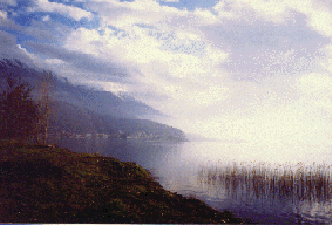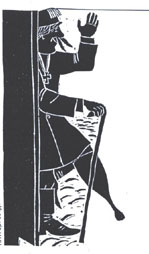 Bogomil
Gjuzel
Bogomil
Gjuzel
The
Wolf at the Door
A Poetic Cycle
translated
from the Macedonian by P. H. Liotta
with an introduction, notes & an afterword
ISBN 1-879-378-45-0 (paper)
95 pages, $7 (see note below Order link)
We speak of the wolf,
and the wolf's at the door
~
Folk saying in the Balkans
From the book cover: photo of Lake Ohrid in Macedonia by Gabriele Kraft ©1996
A search for roots, humanity and survival in the gloom of recent Balkan history. Poems are in verse, but also arranged as prose poems.
The first section, "A Search for Roots," deals with the politics and cultural landscape of Macedonia, with beautiful portrayals of nature and religious monuments. The second section, "Staring at Infinity," refers to classical archetypes, the battle of Troy and the story of Jesus. The last section, "Naked Life," speaks of the family in the midst of violence, devastation and confusion. Illuminating notes clarify the complex politics of the region and its tortured history.
"Bogomil Gjuzel [pronounced Dzyuzel] is Macedonia's greatest living poet. The publication of these fine translations illustrates how the sense of living in tragic times permeates Gjuzel's work. What makes these poems especially moving is their sense of impending doom, the increasing despair and hopelessness in the face of ever-new injustices and sufferings for which there's no easy answer... Only in lyric poetry, as fine as Gjuzel's, can a reliable historical record be found of what it is like to live with great evil."
~ From the introduction by Charles Simic
[Note: Only 11 slightly nicked copies in are
stock; hence the discounted price from the original $15. A reprint is possible,
but the date on this is yet unknown.]
Some of the poems in
The Wolf at the Door are presented as prose poems.
Here is one of them:
Bogomil Gjuzel
THE WRECKAGE RECONSIDERED
translated by P.H. Liotta
More like a shipwreck than rough landing, the Ark's soft gopher wood
that sustained the vessel and that precious cargo was already half rotted
by the flood's retreat when it touched down upon the granite face of Ararat.
Then and now, the wreckage reconsidered. Just as this scroll, this palimpsest,
references its crumbling in our hands.
Those who lived scattered long ago, singly or in pairs... those who survived
that furious disturbance and managed the narrowest escape in the inhuman wave
upon wave of disembarking from a native shore, filled with fear and panic:
They must have been. What matters most is how those whom Yahweh (and likely
Noah too) chose have lived on since then. Human and beast have multiplied,
though not all have prospered. Some have circled once or twice above their
shattered nests, and then climbed Jacob's ladder to the stars.
The old dis-ease and embryonic forms, the new mutation is humanity itself,
the miscegenation of the ethnic tribes - descendants of Noah, children of
the Ark. And with no trace remaining now of Noah, there's only this: the sacred
ritual of the broken Covenant.
What to do with all these refugees, like new Noahs, building their separate
arks after the deluge they cannot believe they survived, these chosen few
whose words will pass among us and who divide us now with their prophecies
of loss, their so-called gods, their certainty of mutual damnation?

From the book: woodcut by folklorist Vuk Karadzik
Catalog | About Us | Links | Order info